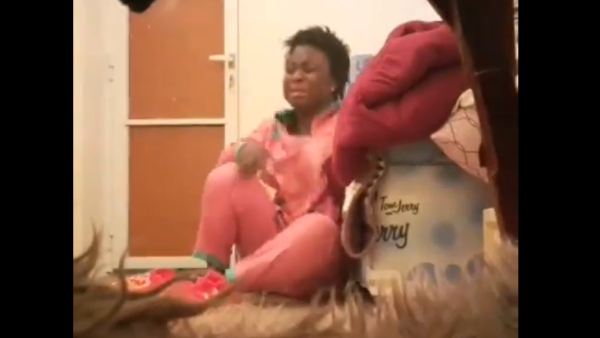A video of a Nigerian domestic worker being beaten up by her employers in Oman went viral on social media, highlighting once again the plight of abuse against domestic workers in the Middle East, drawing calls for more action to protect them.
Hello twitter, this is the story of Lolu, a Nigerian mother of one trafficked to Oman, she was fortunate ti capture this on camera. She says this is a good day, on a bad day the men in the family also join.#projectferry
— Motilola Adekunle (@motiadekunle) January 25, 2020
#notforsale#bringloluhome pic.twitter.com/jULeiSpGVo
Several people online shared the video through Twitter, pointing out that the Nigerian worker, Lolu, didn't choose to migrate to Oman for work, but was rather trafficked into the country and "sold to her employer," but the claims could not be verified.
I’m sorry for what happened to you no one deserves to be hurt in the way you were.u deserve everything and better or should I say the best, be safe plz ,,, @RoyalOmanPolice help her!
— ارمَ دراكَــانـي (@ERAM4c) January 26, 2020
In the GCC and other Arab countries, many households hire female house workers who come from South Asian or African countries, to take care of cleaning and cooking duties around the house. Many workers report human rights violations including long working hours and mistreatment by their employers.
She should contact the Nigerian Embassy in Oman or call them on phone. She is holing something like a phone in the video
— David (@kalmdavid) January 26, 2020
Online reactions expressed outrage and called on the Omani police to intervene over the treatment that Lolu received, as her employer can be heard in the video yelling at her for "not preparing coffee for the guests" while beating her.
Some tried to justify the treatment Lolu received, saying that she provoked her employer and positioned that camera to "stage the abuse scene."
هذي العاملة واضح المكر.. أولا تثبيت الكامرة لتصوير وتعمدت استفزاز المرأة في إعداد القهوة لضيوف حتى تستعطف الناس وتكون في موقف المظلوم حتى ولو مقصره في العمل
— Ahmed Saif (@ahmedsaif73337) January 26, 2020
Translation: "This worker is clearly deceiving. She positioned the camera ahead of everything and provoked the woman by not preparing coffee for the guests to draw sympathy and to frame herself as the poor one to cover up for not doing her job".
But the Twitter user that posted the video clarified that Lolu resorted to filming this particular incident only after having experienced it repeatedly from her employers, including even from the men in the family.
On the contrary, I think the frequency of the abuse necessitated the recording. She was quite fortunate in this recording. She says the men in the house also join in on other days.
— Motilola Adekunle (@motiadekunle) January 26, 2020
#انقذوا_لولو
— سـيلينا عبداللّـه (@Occult5A) January 25, 2020
مايحدث غير إنساني ولايليق بنا معشر البشر فلتنتهي مأساة الرقّ إلى الأبد، إن لم يتنور الناس بحقوق بعضهم بالتوعية فلتردعهم قوّة القانون.@RoyalOmanPolice @OHRC_OMAN@manpowergov#حقوق_العاملات_المنزليات#اسقطوا_نظام_الكفاله https://t.co/ux5miLQJSU
Translation: " #SaveLolu This is inhumane! Humans should know better. Let's end this slavery forever. If people don't know enough about each others' rights, let the force of law take action."
لولو مو اول وحده ولا اخر وحده،ياما في عاملات منزليات يتم حرقهن وتعذيبهن وضربهن واغتصابهن والتحرش بهن.تعامل العرب مع العاملات جميعا والافريقيات ع وجه الخصوص تعامل دنيئ ومايحمل اي صفه انسانيه اتمنى نيجيريا والمنظمات الانسانيه يوقفو معاها ويحاسبو كل شخص مسؤول بأذيتها #انقذوا_لولو
— Veracious ??( بنت نساء ) (@donruiz14) January 26, 2020
Translation: "Lolu isn't the first one to receive this treatment, neither is she that last one. Many domestic workers have been tortured, beaten, harassed, raped and burned. Some Arabs mistreat domestic workers especially African ones and it's nowhere near human. I hope that Nigeria and humanitarian organizations support her and hold anyone who caused her harm accountable."
In recent year, there have been many records of human rights violations against domestic workers in countries across the Middle East. Workers often reported their employers confiscating their passports, giving them very little to no breaks or days off, denying them food, in addition to them beating them.
According to a 2017 Human Rights Watch report, there are 2.4 million migrants domestic workers in the Gulf states, the majority of whom were from Asian countries. The HRW report confirmed "the sponsorship system in Oman and the UAE prohibits migrant workers from leaving their employers or working for new ones without the sponsor's permission." The report also noted that Omani labor laws "exclude domestic workers from its protection entirely."
#انقذوا_لولو
— sillyBnotah (@SillyBnotah) January 25, 2020
الي صار مع لولو مو بس في عمان هو مشهد يتكرر في كل الدول العربيه والسبب هو نظام الكفاله عبوديه جديده
Translation: "Many other domestic workers face this not only Lolu and not only in Oman. This happens in all Arab countries, and the reason for it is the sponsorship system which is really another name for slavery."








